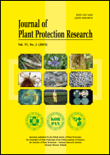
JOURNAL OF PLANT PROTECTION RESEARCH
Scope & Guideline
Bridging science and practice for a healthier planet.
Introduction
Aims and Scopes
- Integrated Pest Management (IPM):
The journal emphasizes research on integrated pest management strategies that incorporate biological control, cultural practices, and chemical methods to sustainably manage pests and diseases in crops. - Biological Control Agents:
Research on biological control agents, including beneficial microorganisms and natural predators, plays a significant role in the journal, focusing on their efficacy in controlling plant pests and diseases. - Plant-Microbe Interactions:
The journal explores the interactions between plants and microorganisms, including pathogenic and beneficial relationships, to understand disease mechanisms and enhance plant health. - Agricultural Biotechnology:
Studies involving genetic engineering, CRISPR technology, and other biotechnological advancements for developing disease-resistant plant varieties are prominent, reflecting the journal's commitment to innovative agricultural practices. - Natural Products and Biopesticides:
The exploration of natural compounds and extracts from plants as potential biopesticides and growth enhancers is a unique aspect of the journal, promoting environmentally friendly pest management solutions. - Field and Laboratory Studies:
Research methodologies include both field trials and controlled laboratory experiments to evaluate pest control strategies, plant responses, and disease management techniques.
Trending and Emerging
- Use of Biostimulants:
Research on biostimulants and their role in enhancing plant growth and resistance against pests and diseases is gaining traction, indicating a shift towards more sustainable agricultural practices. - Nanotechnology in Agriculture:
The application of nanotechnology for pest management and disease control is emerging as a significant theme, showcasing innovative approaches to enhance the effectiveness of pesticides and fertilizers. - Machine Learning and AI in Plant Protection:
The integration of machine learning and artificial intelligence for disease detection and pest management is trending, reflecting the growing interest in data-driven agricultural practices. - Plant-Based Pest Control Solutions:
There is an increasing focus on exploring plant-derived compounds and extracts as alternatives to synthetic pesticides, aligning with global trends towards organic and sustainable agriculture. - Climate Change Impacts on Crop Protection:
Research addressing the effects of climate change on pest dynamics and disease prevalence is becoming more prominent, highlighting the need for adaptive management strategies.
Declining or Waning
- Chemical Pesticide Efficacy Studies:
There is a noticeable decrease in studies solely focused on the efficacy of synthetic chemical pesticides, possibly due to increasing interest in sustainable and organic farming practices. - Traditional Agricultural Practices:
Research focusing exclusively on conventional agricultural practices is less common, as the emphasis shifts towards integrated and sustainable approaches to pest management. - Invasive Species Assessments:
While still relevant, the frequency of papers dedicated solely to assessing the impacts of invasive species has waned, likely due to a broader focus on integrated pest management strategies. - Soil Microbial Communities:
Although soil health remains crucial, specific studies on soil microbial communities in isolation are becoming less prominent, with more integrated approaches being favored.
Similar Journals

INDIAN JOURNAL OF AGRICULTURAL SCIENCES
Fostering collaboration for sustainable agricultural practices.Welcome to the Indian Journal of Agricultural Sciences, a vital resource for researchers and professionals in the field of agricultural sciences, published by the esteemed Indian Council of Agricultural Research. Established in 1974, this journal aims to disseminate high-quality research and developments in agronomy and crop science, facilitating knowledge exchange and advancement within the agricultural community. Though currently classified in the Q4 category according to 2023 data, it provides an essential platform for publication, contributing valuable insights towards sustainable agricultural practices. With an ISSN of 0019-5022 and an E-ISSN of 2394-3319, the journal houses important research that spans decades of convergence and collaboration, promoting innovation in agriculture across India and beyond. As an open access platform, it invites contributions that reflect a wide array of agricultural disciplines to foster sustainable food systems that address the challenges of food security. Join the network of scholars and practitioners by sharing your research and engaging with the profound work being done in this transformative field.

Biocatalysis and Agricultural Biotechnology
Advancing Sustainable Solutions in AgricultureBiocatalysis and Agricultural Biotechnology, published by Elsevier, is a distinguished journal in the fields of agronomy, biotechnology, and applied microbiology. With an E-ISSN of 1878-8181, this journal has an impressive impact factor and consistently ranks in the top quadrants of Scopus, notably Q1 in Agronomy and Crop Science and Q2 in several related categories. Since its inception in 2012, it aims to bridge the gap between biocatalysis applications and agricultural practices, fostering innovative research that advances sustainable agriculture and biotechnological applications. The journal is highly regarded, with a Scopus rank of #47 out of 406 in Agronomy and Crop Science, exemplifying its significance in the academic community. As an essential resource for researchers, professionals, and students, it provides a platform for sharing cutting-edge findings that address crucial global challenges in food security, environmental sustainability, and biotechnological advancements. Located in Amsterdam, Netherlands, the journal continues to contribute to the growth and interdisciplinary dialogue in agricultural and biological sciences.

PHYTOPATHOLOGY
Exploring innovative solutions for sustainable agriculture.PHYTOPATHOLOGY, published by the American Phytopathological Society, is a premier journal dedicated to advancing the science of plant pathology. With an ISSN of 0031-949X and E-ISSN 1943-7684, this journal has been a cornerstone of scholarly communication in the field since its inception in 1946. Ranked in the top quartile (Q1) in both Agronomy and Crop Science and Plant Science for 2023, PHYTOPATHOLOGY has garnered notable recognition with Scopus ranks placing it at #86/516 (83rd percentile) in Plant Science and #69/406 (83rd percentile) in Agronomy and Crop Science. The journal publishes high-quality research articles, reviews, and case studies that explore innovative solutions to plant diseases, thereby supporting agricultural productivity and sustainability. While currently not an open-access journal, it offers vital insights and findings that are invaluable to researchers, professionals, and students aiming to advance their knowledge and contribute to the field of plant sciences.
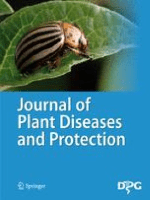
Journal of Plant Diseases and Protection
Exploring Innovations in Disease ManagementThe Journal of Plant Diseases and Protection, published by SPRINGER HEIDELBERG in Germany, is a premier platform for the dissemination of cutting-edge research in the fields of Agronomy, Horticulture, and Plant Science. With its Q2 ranking in multiple categories as of 2023, this journal stands out in the academic landscape, highlighting its strong performance with a notable Scopus rank of 22nd in Horticulture and placing in the top percentile for Agronomy and Plant Science. The journal spans from 2006 to 2024, making it a valuable resource for researchers, professionals, and students seeking to stay abreast of advancements in the understanding of plant diseases and their protection. The Open Access options further enhance its accessibility, fostering a global exchange of knowledge essential for addressing contemporary agricultural challenges.
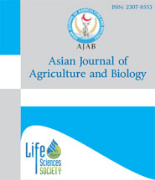
Asian Journal of Agriculture and Biology
Elevating standards in agricultural and biological sciences through open access.Welcome to the Asian Journal of Agriculture and Biology, a premier open access journal published by LIFE SCIENCES SOC PAKISTAN, dedicated to advancing research in the fields of agricultural and biological sciences. Since its inception in 2013, this journal has provided a vital platform for scholars and practitioners to disseminate novel findings and innovative methodologies that contribute to the betterment of agricultural practices and biological research. With an impressive H-Index and ranked in the Q3 category across multiple disciplines including Agricultural and Biological Sciences, Biochemistry, Genetics, and Molecular Biology, as well as Medicine, the journal showcases high-quality research that influences both academic and practical applications globally. The journal is indexed in Scopus, reinforcing its commitment to high academic standards and providing researchers with efficient access to significant knowledge. Based in Pakistan, the Asian Journal of Agriculture and Biology is your gateway to staying abreast of the latest trends and discoveries that support sustainable development and health sciences.
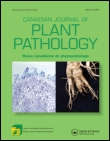
CANADIAN JOURNAL OF PLANT PATHOLOGY
Elevating the understanding of plant diseases for a sustainable future.Canadian Journal of Plant Pathology, published by Taylor & Francis Inc, is a leading academic journal dedicated to advancing the field of plant pathology, with a significant focus on the interplay between plant health and environmental factors. Established in 1979, this journal has established a reputation for high-quality research, currently holding a commendable impact factor within its category. As of 2023, it ranks in the Q2 quartile for both Agronomy and Crop Science as well as Plant Science, highlighting its importance and influence in these domains. With an impressive ranking of 142/516 in Plant Science and 115/406 in Agronomy and Crop Science according to Scopus, the journal is positioned within the 72nd and 71st percentiles, respectively. The Canadian Journal of Plant Pathology serves as a vital platform for researchers, professionals, and students aiming to contribute to the understanding of plant diseases, fostering innovation and development in agricultural practices.

Horticultural Science & Technology
Cultivating knowledge at the intersection of science and technology.Horticultural Science & Technology is a leading journal in the field of horticulture, published by the Korean Society of Horticultural Science. With an ISSN of 1226-8763 and an E-ISSN of 2465-8588, it serves as a critical platform for disseminating cutting-edge research and advancements in horticultural science worldwide. The journal holds a prestigious Q2 category ranking in Horticulture for 2023, placing it among the top half of its field, as reflected by its Scopus rank of #56 out of 115. Operating from South Korea and backed by institutional affiliations with the National Institute of Horticultural & Herbal Science, the journal aims to promote innovative agricultural practices and sustainable horticultural techniques. Its open-access model ensures that research findings are readily available to both professionals and academics, fostering collaboration and knowledge sharing in the global horticultural community. As it continues to evolve through its converged years from 2008 to 2024, Horticultural Science & Technology remains an invaluable resource for scholars, practitioners, and students dedicated to advancing the art and science of horticulture.

PHYTOPARASITICA
Fostering Knowledge for Ecological Harmony and Sustainability.PHYTOPARASITICA, published by SPRINGER in the Netherlands, is a distinguished journal dedicated to the fields of Insect Science and Plant Science. With an impressive convergence of research from 1973 to 2024, the journal holds a notable position in academic circles, ranking in Q2 for both categories as of 2023, according to Scopus metrics. This places PHYTOPARASITICA within the top 67th percentile for Insect Science and the 59th percentile for Plant Science, reflecting its significant impact on research and advancements in these crucial fields. The journal is committed to disseminating high-quality, peer-reviewed research that addresses the interplay between plants and their parasitic organisms, contributing to the broader understanding of agricultural sustainability and ecological balance. Researchers, professionals, and students will find this journal an essential resource for cutting-edge insights and developments within its domain.
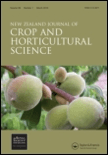
NEW ZEALAND JOURNAL OF CROP AND HORTICULTURAL SCIENCE
Transforming Agriculture with Cutting-edge ResearchThe New Zealand Journal of Crop and Horticultural Science, published by Taylor & Francis Ltd, stands as a key resource in the fields of Agronomy and Horticulture, with a commendable impact factor reflecting its quality and influence in the scientific community. Since its inception in 1989, this journal has been committed to advancing our understanding of crop development and horticultural practices, catering not only to researchers and professionals but also to students eager to delve into the intricacies of plant sciences. With a Q3 ranking in both Agronomy and Crop Science and Horticulture as of 2023, the journal occupies a significant position within the agricultural and biological sciences domain, significantly contributing to the body of knowledge in these fields. The journal features original research, reviews, and technical notes that cover a wide range of topics, ensuring a comprehensive perspective on contemporary and emerging agricultural issues. For individuals interested in accessing cutting-edge research, the journal provides subscription-based access, further enhancing its scholarly contributions.
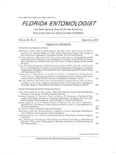
FLORIDA ENTOMOLOGIST
Illuminating the Path of Insect Science and EcologyFLORIDA ENTOMOLOGIST is a prestigious peer-reviewed journal dedicated to the advancement of entomological sciences, published by Walter de Gruyter GmbH. Since its transition to open access in 1994, the journal has become a vital resource for researchers, students, and professionals in the fields of Insect Science and Ecology, Evolution, Behavior, and Systematics. With an impact factor ranking high in its category—Q2 in Insect Science and Q3 in Ecology, Evolution, Behavior and Systematics—the journal showcases significant findings and contributions that shape our understanding of insect biology and its implications for ecological systems. The journal is indexed in Scopus, further establishing its relevance, with current rankings reflecting its competitive standing within Agricultural and Biological Sciences. Published continuously since 1982, FLORIDA ENTOMOLOGIST not only facilitates the dissemination of knowledge among entomologists but also encourages interdisciplinary collaboration, making it an essential publication for anyone invested in the scientific study of insects.